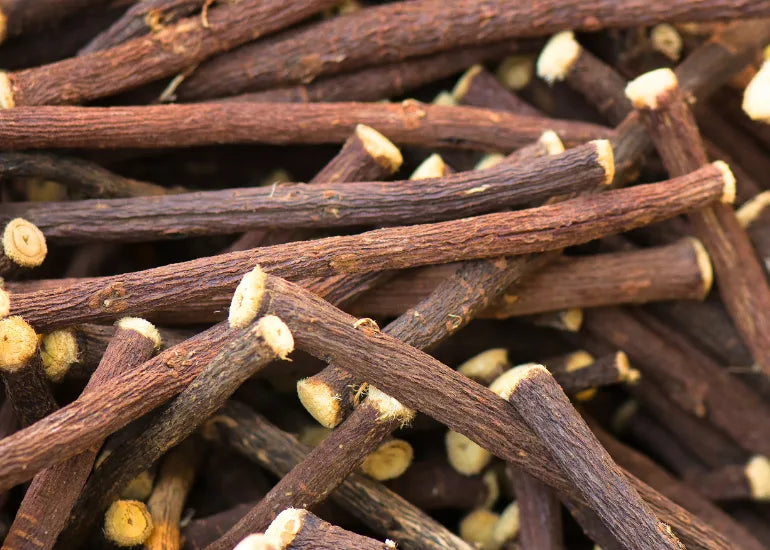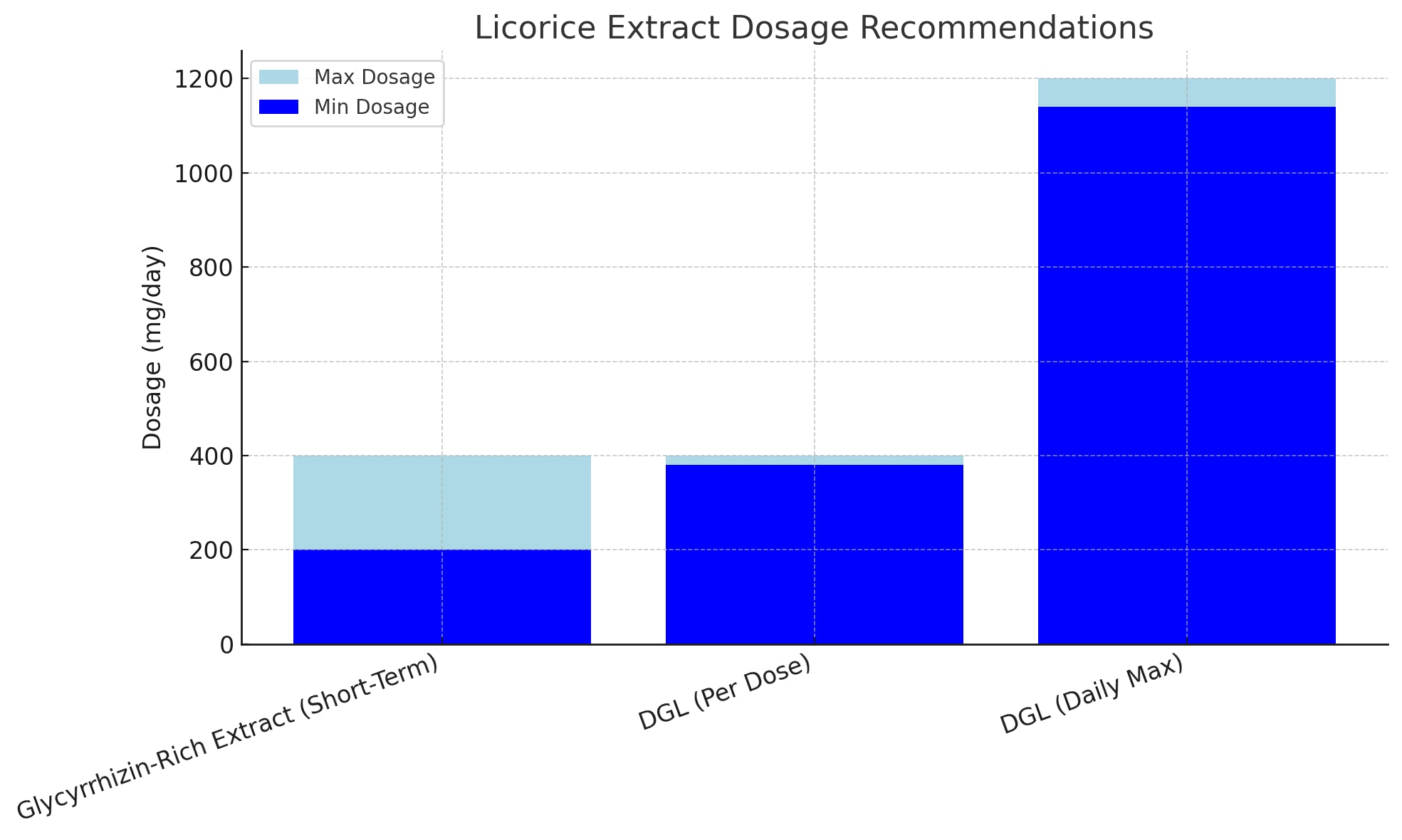
Licorice (Glycyrrhiza glabra) is a sweet-tasting root that has held medicinal importance for thousands of years. From ancient Egypt and China to Greece and Rome, licorice was revered as a universal healing herb soothing everything from coughs and indigestion to hormonal imbalances and inflammation.
The plant grows widely across Europe and Asia, producing long roots that contain the main bioactive compound glycyrrhizin, along with over 300 other active substances, including:
Licorice works similarly to prescription drugs for stomach acid, but without interfering with digestion or increasing nutrient deficiencies like many antacids do.Today, modern extraction methods concentrate these compounds into a potent herbal supplement: Licorice Extract.
Licorice Extract is produced through a careful process that starts with harvesting mature licorice roots, which are cleaned, dried, and then either ground or soaked in a liquid (typically alcohol or glycerin).
There are two primary extract types:
Miduty uses scientific extraction protocols that preserve the herb's potency while eliminating impurities. This results in a standardized extract, meaning each dose consistently delivers effective amounts of glycyrrhizin or other desired components.
Unlike many herbs that offer just one therapeutic action, licorice delivers multi-dimensional benefits:
In other words, licorice is not just a digestive herb or a hormonal balancer it’s both, and much more. It's especially valuable in people suffering from chronic stress, digestive inflammation, or hormonal fluctuations, making it a powerful tool for modern health challenges.
1) Licorice extract in Miduty Lung Detox is apart from generic alternatives because of its clinical dosing, with therapeutic levels of glycyrrhizin. Miduty sources licorice from pesticide-free roots and uses a clean, solvent-free extraction process that avoids high heat and harsh chemical practices that often degrade important compounds in other products.
2) This method maintains the full integrity of flavonoids and polysaccharides, removes heavy metals and microbial contaminants, and preserves both the efficacy and natural taste of the root. With no magnesium stearate or harmful fillers, Miduty delivers a safe, potent, and superior-quality Licorice Extract that truly stands out in the respiratory wellness space.
| Uses & Benefits | Description |
| Immune Enhancement and Viral Defense |
Licorice has broad antiviral properties that make it helpful during colds, flus, and respiratory infections. It can: [1]
|
| Reduces Inflammation and Calms the Skin |
Licorice’s flavonoids and glycyrrhizin are natural anti-inflammatories, helping: [3] [4]
|
| Hormonal and Adrenal Support |
Licorice is one of the few herbs known to modulate cortisol, the body’s main stress hormone. It does this by: [6]
This makes licorice ideal for:
|
| Support for Digestive Health and Ulcers |
Licorice is perhaps most famously used to support the stomach lining and digestive tract. The extract: [8] [9]
Licorice is especially useful for:
|

Typical licorice extract doses are:
Duration of use depends on the form:
DGL (Deglycyrrhizinated): Best for digestive healing without affecting blood pressure or potassium.
Full-spectrum extract (with glycyrrhizin): Ideal for hormonal support, adrenal fatigue, or viral illness.
For digestive health, the timing of Licorice Extract is crucial to maximize its coating and healing effects. The best practice is:
This creates a mucosal barrier that protects and helps heal the stomach lining without reducing stomach acid, which is essential for digestion.
Licorice's unique effect on cortisol metabolism makes it incredibly useful in stress recovery and adrenal fatigue but only when taken at the right time.
Licorice also supports menstrual hormone balance, so it can be used in:
For respiratory relief and immune defense:
For allergy-related symptoms (sneezing, itchy throat, post-nasal drip), it works well when paired with quercetin or vitamin C take one dose in the morning and another before exposure to allergens.
Licorice Extract is generally safe for short-term use, especially in DGL form. However, excessive or long-term intake of glycyrrhizin-rich extracts can lead to:
To avoid this:
You should consult your healthcare provider before using licorice if you:
DGL licorice, on the other hand, is safe for longer-term use and for individuals with hypertension since it lacks the glycyrrhizin compound that can raise blood pressure.
Licorice works beautifully in synergy with other herbs and nutrients. For best results:
These combinations amplify the impact of licorice while creating a full-spectrum wellness protocol.
Licorice is especially useful for people dealing with:
Its broad-spectrum action and soothing nature make it a reliable go-to for those who want to heal deeply and naturally. In a fast-paced world full of stress, poor diet, and over-reliance on medications, Licorice Extract offers a gentle yet powerful alternative.
It soothes where others irritate, calms where others overstimulate, and restores where imbalance reigns. And when it comes from a trusted brand like Miduty, you know you’re getting a product that’s pure, potent, and purposefully crafted.
Licorice extract, obtained from the Glycyrrhiza glabra plant, is widely used in herbal medicine and as a natural flavoring. It’s valued for its anti-inflammatory, antiviral, and soothing effects on digestive issues like heartburn and ulcers, and also supports respiratory health and skin care.
People with high blood pressure, heart conditions, kidney issues, or low potassium levels should avoid licorice, especially in large amounts. Pregnant women and those taking certain medications should also consult a doctor before using it.
Licorice can be taken daily in moderate amounts for respiratory support, as it may help soothe the airways, reduce inflammation, and ease coughing. However, long-term use should be monitored, especially for those with underlying health conditions.
Licorice is known to support lung health by acting as a natural expectorant, helping to clear mucus and ease breathing. Its soothing effects also make it helpful for calming coughs, sore throats, and respiratory irritation.
Yes, licorice can help clear mucus from the respiratory tract. Its natural expectorant properties help loosen and expel mucus, making it easier to breathe and relieving congestion.
